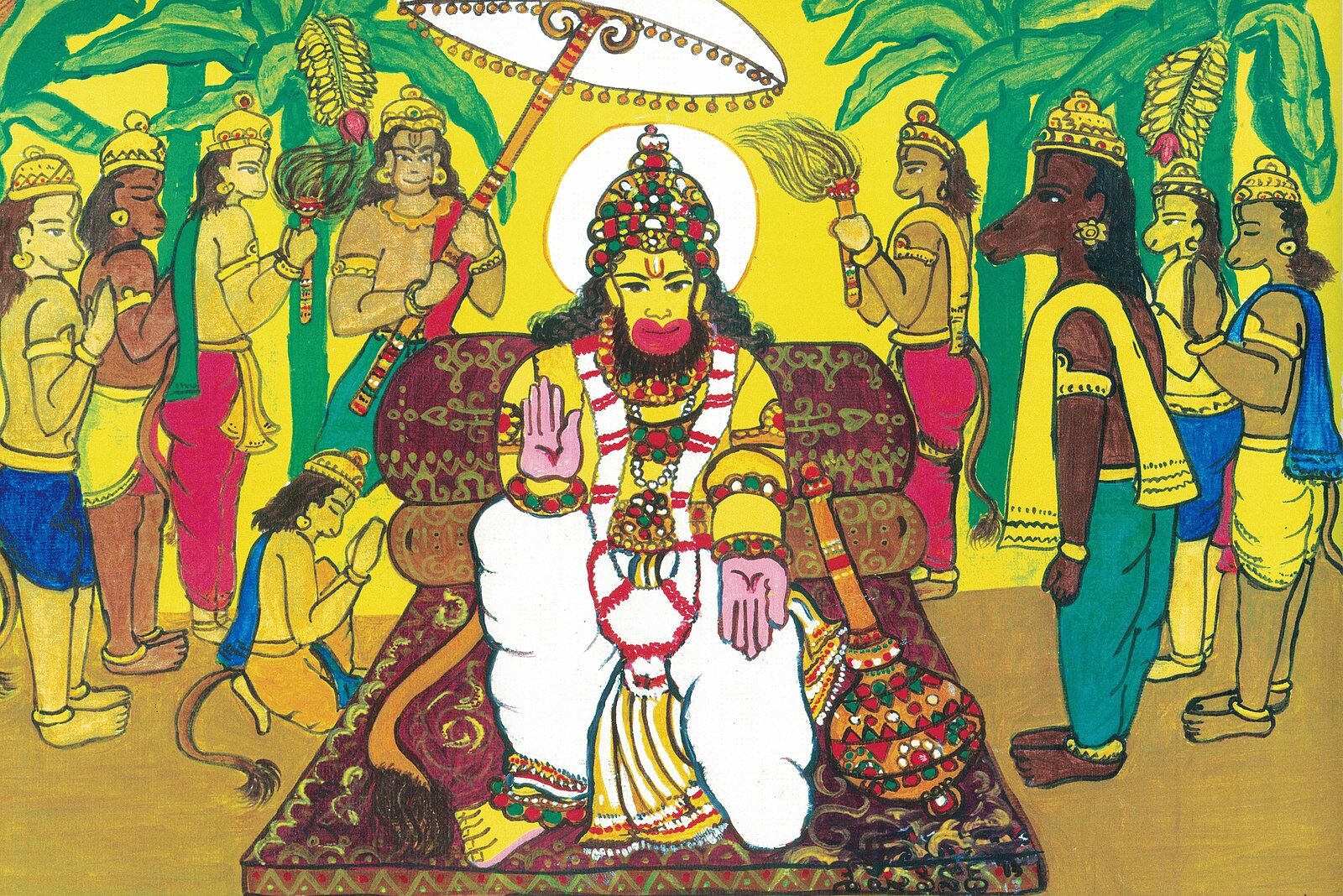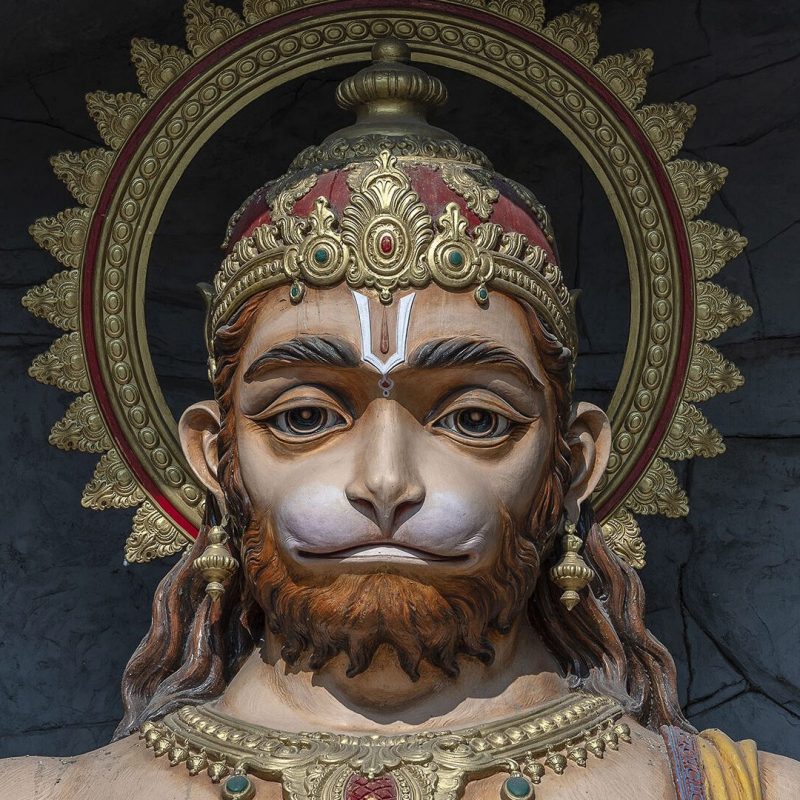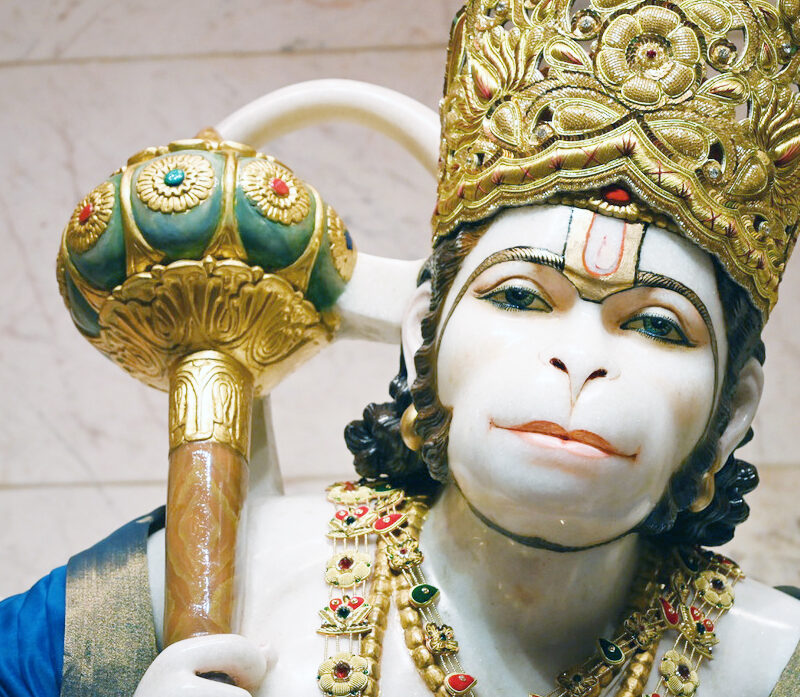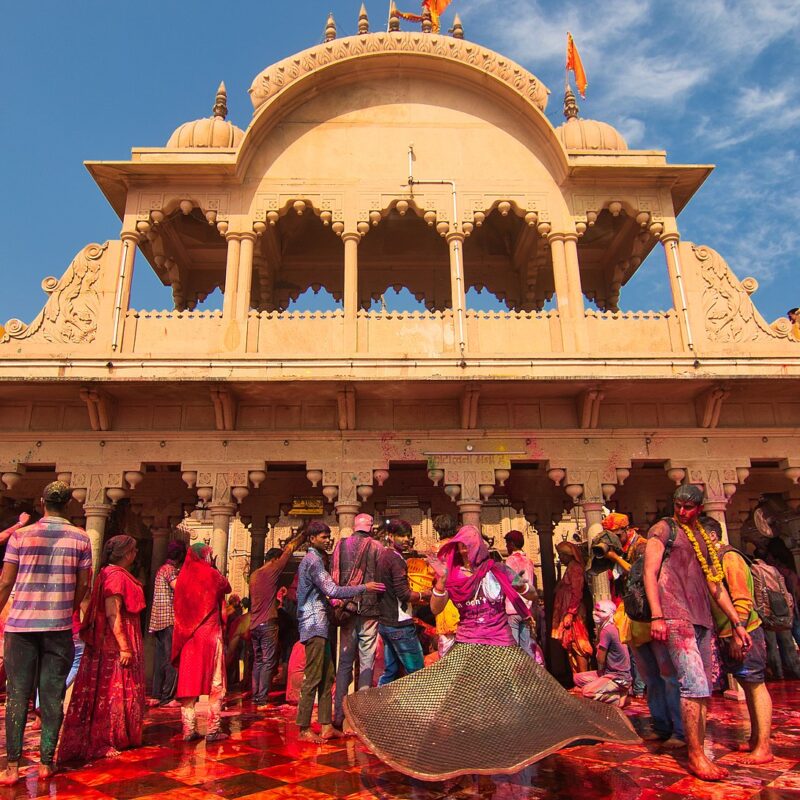
“Basdeo Panday, Trinidad’s first Hindu Prime Minister, charmed the massive 50,000 person crowd at January’s ‘Puja 2000,’ when he burst into a popular Hindu song to Lord Hanuman… Never before has a Prime Minister even attempted to pray with the Hindu community in such a real and emotional manner. By the second verse the crowd joined in. As the Prime Minister shouted at the end ‘Prem se bolo, Hanuman Ki Jai’ [‘Sing with love, Hail to Hanuman’] the crowd of thousands joined with him in a single voice that would have been heard for miles away…”
Over the centuries, Hindu saints have produced a multitude of devotional compositions, all of which have brought some level of love and joy to the hearts of countless who have basked in the stirring strains of their divine lyrics.
Yet, there’s something about the 40-verse ode to Hanuman that especially resonates with devotees, as so vividly conveyed in Hinduism Today’s account of Trinidad and Tobago’s elated crowd of chanters.
Echoing the voices of their ancestors, who found solace in the Chalisa when they were first brought to the island to toil in subhuman conditions under an oppressive system of indentureship, you can imagine how they must have sounded in that moment, a moment that can only be described as a most unique and powerful expression of Hindu spirituality.
To fully understand the depth of this moment, one must understand the Chalisa, and to properly understand the Chalisa, one must learn of its author — the famed Hindu poet, Tulsidas — and how he came to write it.
Born roughly 500 years ago in India’s Gangetic plains, Tulsidas himself was no stranger to hardship. While he is said to have miraculously uttered the words “Rama, Rama!,” at the time of his birth, as if declaring to the world the auspiciousness of his ultimate life’s purpose, his parents abandoned him anyway, when his horoscope revealed he would be a harbinger of misfortune.
Though raised thereafter by a family nurse, she died when he was just a child, an event that spurred him to look for his parents with hopes they would take him back. Discovering, however, that they too had already died, he was left to fend for himself, and so began living as a wandering beggar.

Noticing Tulsidas’ cleverness and impressed by his natural talent for language, Naraharidas, a devotee of the Ramananda tradition, took the young boy under his wing, initiating him as his disciple, and narrating to him his first ever hearing of the Ramayana.
Thus cultivating the seed of devotion to Rama that seemed to inherently exist in the young boy, Naraharidas bestowed his blessings on Tulsidas, who later went to the sacred city of Varanasi, where he received an education in philosophy, Sanskrit grammar, and the regional language, Awadhi.
Despite such erudition, several accounts say that after Tulsidas got married, he became so fond of his wife Ratnavali, that he was actually unhinged in his passion for her.
Once, when he returned home from a trip, he wanted nothing more than her amorous embrace, but could not fulfill his desire because of a violent storm that made it unsafe for her to cross the river from her mother’s house, where she was staying while he was away.
Unwilling to wait until the next day, Tulsidas, in the middle of the night, dove into the river, grabbing a floating log to help him against the turbulent waters. Barely making it to the other side, he swiftly jumped onto the banks and ran to his mother-in-law’s house in an uncontrolled frenzy.
When Ratnavali saw Tulsidas in his maddened condition and discovered what he had done, rather than share his amorous enthusiasm, she became horrified and embarrassed by his actions.
Concerned not only for his reputation, but his overall spiritual welfare, she immediately scolded him, exclaiming that if he had even half the amount of devotion for Rama that he had for her body, he would be a fully realized saint by now.

Stricken by her chastisement, Tulsidas left the home in a pensive state, and began making his way back to the river. Upon reaching the bank from which he came, he suddenly understood, to his horror, that the log he used to help him cross the stormy waters was actually a corpse.
At that instance, as the first light of dawn appeared in the sky, revealing in stark fashion how truly blinded by lust he was, a new kind of light emerged from within Tulsidas, revealing, more clearly than ever before, the real spiritual purpose of his life.
Resolving there and then to re-dedicate his life to Rama, Tulsidas began living as an ascetic, traveling from one place to the next, yearning for the sight of his beloved deity, just as he once yearned for his wife’s.
One day, while offering water to a tree, a ghost occupying the space appeared before Tulsidas, wanting to give him a boon for having quenched his thirst. With only one goal in mind, Tulsidas instantly stated his desire to see Rama, to which the ghost responded that only Hanuman, Rama’s most loyal servant, could fulfill such a wish.
It just so happened, the ghost told Tulsidas, that Hanuman, disguised as a leper, attended the public narrations of Rama regularly given in Varanasi. If Tulsidas could somehow gain his favor, then perhaps the famed vanara (the race of intelligent monkey warriors Hanuman belonged to) would be willing to help.
Losing no time in heeding the ghost’s advice, the next day Tulsidas went to the purported spot of the narrations, and immediately took notice of an old leper listening attentively near the back of the audience.
As the narrations came to a close, Tulsidas quietly followed the leper into the woods, after which he made himself known and fell at his feet, begging for the chance to see Rama.

First feigning ignorance, the leper was eventually won over by Tulsidas’ persistence, and subsequently revealed his true form as Hanuman. Pleased by Tulsidas’ devotion, Hanuman told him to go to the city of Chitrakuta, where he would be able to see Rama with his own eyes.
Following Hanuman’s instructions, Tulsidas moved to Chitrakuta, where he indeed had two visions of Rama — one of him and his brother Lakshman on horseback, and another in which Rama appeared to him as a young boy.
Enraptured by these visions, Tulsidas became inspired to compose his own telling of the Ramayana, and became even more inspired when Shiva and Parvati came to him in a dream, ordering him to write it in the local Awadhi language, so that the story could be easily accessible to all sections of society, not just those who were adept in Sanskrit.
Taking on the challenge with enthusiasm and vigor, his version, known as the Ramacharitmanas (“Lake of the Deeds of Rama”), was an enormous success. As the years rolled by and its popularity grew, so did the reputation of his own spiritual potency, with many claiming he could even bring the dead back to life through the mere sound of his poetry.
Hearing of such tales, Mughal emperor Akbar ordered Tulsidas to appear at his court in Agra. Though, by this time, the saint had grown quite old and had been suffering a myriad of health problems, including joint pains and boils on his body, he could not refuse the call of the emperor, and so reluctantly made the trip.
At court, Akbar demanded Tulsidas show him some of the miracles he had been hearing about. The saint, however, said he was no sorcerer, but a simple poet and devotee of Rama, who was the true worker of miracles. Falsely perceiving Tulsidas’ humility as an outright act of defiance, the emperor had him thrown in jail.
It was in this jail that the culmination of Tulsidas’ spiritual evolution manifested in a most amazing way. Rather than appeal to any sort of external forces for the solution to what was perhaps his most vulnerable moment, as he once would have done, he turned inward, composing the Hanuman Chalisa.

And why did he, a self-proclaimed devotee of Rama, pray to Hanuman during possibly his darkest hour, rather than Rama himself?
On a personal level, it was Hanuman who enabled him to see Rama. By Hanuman’s compassion, Tulsidas was able to deepen his relationship with Rama to a point he could not have imagined, so it was through his gratitude to Hanuman he felt most intimately connected to his cherished deity.
On a more general level, however, Hanuman, as Rama’s most loyal devotee, is his most empowered servant, described as being the perfect combination of bal (strength), buddhi (intelligence), and vidya (wisdom), who can remove obstructions to success in any endeavor.
And for those endeavoring to turn inward and deepen their connection to his beloved Rama, he helps them all the more, especially when they call to him with a sincerity that often only manifests when a person feels particularly helpless.
Akbar laid witness to this truth himself, for after Tulsidas completed 40 days of praise to Hanuman from the prison, an army of monkeys descended on the city, wreaking havoc in the palace, the bazaar, and people’s homes, forcing the emperor to apologize profusely to the saint and set him free.
Though an army of monkeys may not come to the rescue of those who recite the devotional poem today, the Chalisa still contains the ability to set any person free.
This freedom is experienced in a most unique and powerful moment of Hindu spirituality, when we reach out to the Divine in our darkest hour, and experience the intelligence, wisdom, and strength of a higher power that assures us we are of a spiritual nature that is beyond the struggles of this world.
This is the true miracle Akbar should have been looking for, a miracle Tulsidas displayed through the journey of his own life, and a miracle that can be perceived by any who recite the Chalisa with the right intention.

Hanuman Chalisa provided by Shlokam.org

Having polished the mirror of my heart with the dust of my Guru’s lotus feet, I recite the divine fame of the greatest king of Raghukul dynasty, which bestows us with the fruit of all the four efforts.
Knowing that this mind of mine has less intelligence, I remember the “Son of Wind” who, granting me strength, wisdom and all kinds of knowledge, removes all my suffering and shortcomings.
Victory to Lord Hanuman, the ocean of wisdom and virtue. Victory to the Lord who is supreme among the monkeys, illuminator of the three worlds.
You are Lord Rama’s emissary, the abode of matchless power, Mother Anjani’s son and also popular as the “Son of the Wind.”
Great hero, you are as mighty as a thunderbolt. you remove evil intellect and are the companion of those having good ones.
Your skin is golden in color and you are adorned with beautiful clothes. you have adorning earrings in your ears and your hair is curly and thick.
In your hands, shine a mace and a flag of righteousness. A sacred thread adorns your right shoulder.
You are the embodiment of Lord Shiva and vanar-raj Kesari’s son. There is no limit or end to your glory, your magnificence. The whole universe worships you.
You are the wisest of the wise, virtuous and (morally) clever. You are always eager to do Lord Rama’s works.
You feel extremely delighted in listening to Lord Rama’s doings and conduct. Lord Rama, Mother Sita, and Lord Laxmana dwell forever in your heart.
Taking the subtle form, you appeared in front of Mother Sita. And, taking the formidable form, you burnt the Lanka (Ravana’s kingdom).
Taking the massive form (like that of Bheema), you slaughtered the demons. This is how, you completed Lord Rama’s tasks, successfully.
Bringing the magic-herb (sanjivani), you revived Lord Laxmana.
Raghupati, Lord Rama praised you greatly and overflowing in gratitude, said that you are a dear brother to him just as Bharat is.
Saying this, Lord Rama drew you to himself and embraced you. Sages like Sanaka, Gods like Brahma and sages like Narada and even the thousand-mouthed serpent sing your fame!
Sanak, Sanandan and the other Rishis and great saints; Brahma – the god, Narada, Saraswati – the Mother Divine and the King of serpents sing your glory.
Yama, Kubera and the guardians of the four quarters; poets and scholars – none can express your glory.
You helped Sugriva by introducing him to Lord Rama and regaining his crown. Therefore, you gave him the Kingship (the dignity of being called a king).
Likewise, complying with your preachings, even Vibhishana became the King of Lanka.
You swallowed the sun, located thousands of miles away, mistaking it to be a sweet, red fruit!
Keeping the ring in your mouth, which was given to you by Lord Rama, you crossed over the ocean, to no astonishment, whatsoever.
All difficult tasks of this world become easy, with your grace.
You are the guardian at Lord Rama’s door. Nobody can move forward without your permission which means that Lord Rama’s darshans (to get the sight of) are possible only with your blessings.
Those who take refuge in you, find all the comforts and happiness. When we have a protector like you, we do not need to get scared of anybody or anything.
You alone can withstand your magnificence. All the three worlds start trembling at one roar of yours.
O Mahaveer! No ghosts or evil spirits come near the ones who remember your name. Therefore, just remembering your name does everything!
O Hanuman! All diseases and all kinds of pain get eradicated when one recites or chants your name. Therefore, chanting your name regularly is considered to be very significant.
Whoever meditates upon or worships you with thought, word, and deed, gets freedom from all kinds of crisis and affliction.
Lord Rama is the greatest ascetic amongst all the kings. But, it’s only you who carried out all the tasks of Lord Sri Rama.
One who comes to you with any longing or a sincere desire obtains the abundance of the manifested fruit, which remains undying throughout life.
Your splendor fills all the four ages. And, your glory is renowned throughout the world.
You are the guardian of saints and sages; the destroyer of demons and adored by Lord Rama.
You have been blessed by Mother Janaki to give boon further, to the deserving ones, wherein you can grant the siddhis (eight different powers) and the nidhis (nine different kinds of wealth).
You have the essence of Ram bhakti, may you always remain the humble and devoted servant of Raghupati.
When one sings your praise, your name, he gets to meet Lord Rama and finds relief from the sorrows of many lifetimes.
By your grace, one will go to the immortal abode of Lord Rama after death and remain devoted to him.
It is not needed to serve any other deity or god. Service to Lord Hanuman gives all the comforts.
All troubles cease for the one who remembers the powerful lord, Lord Hanuman and all his pains also come to an end.
O Lord Hanuman! Praises and glory to you O mighty lord, please bestow your grace as our supreme guru.
One who recites this Chalisa a hundred times is released from all bondages and will attain great bliss.
One who reads and recites this Hanuman Chalisa, all his works get accomplished. Lord Shiva, himself, is the witness to it.
O Lord Hanuman, may I always remain a servant, a devotee to Lord Sri Ram, says Tulsidas. And, may you always reside in my heart.
O the Son of Wind, you are the destroyer of all sorrows. you are the embodiment of fortune and prosperity.
With Lord Rama, Laxmana and Mother Sita, dwell in my heart, always.









































